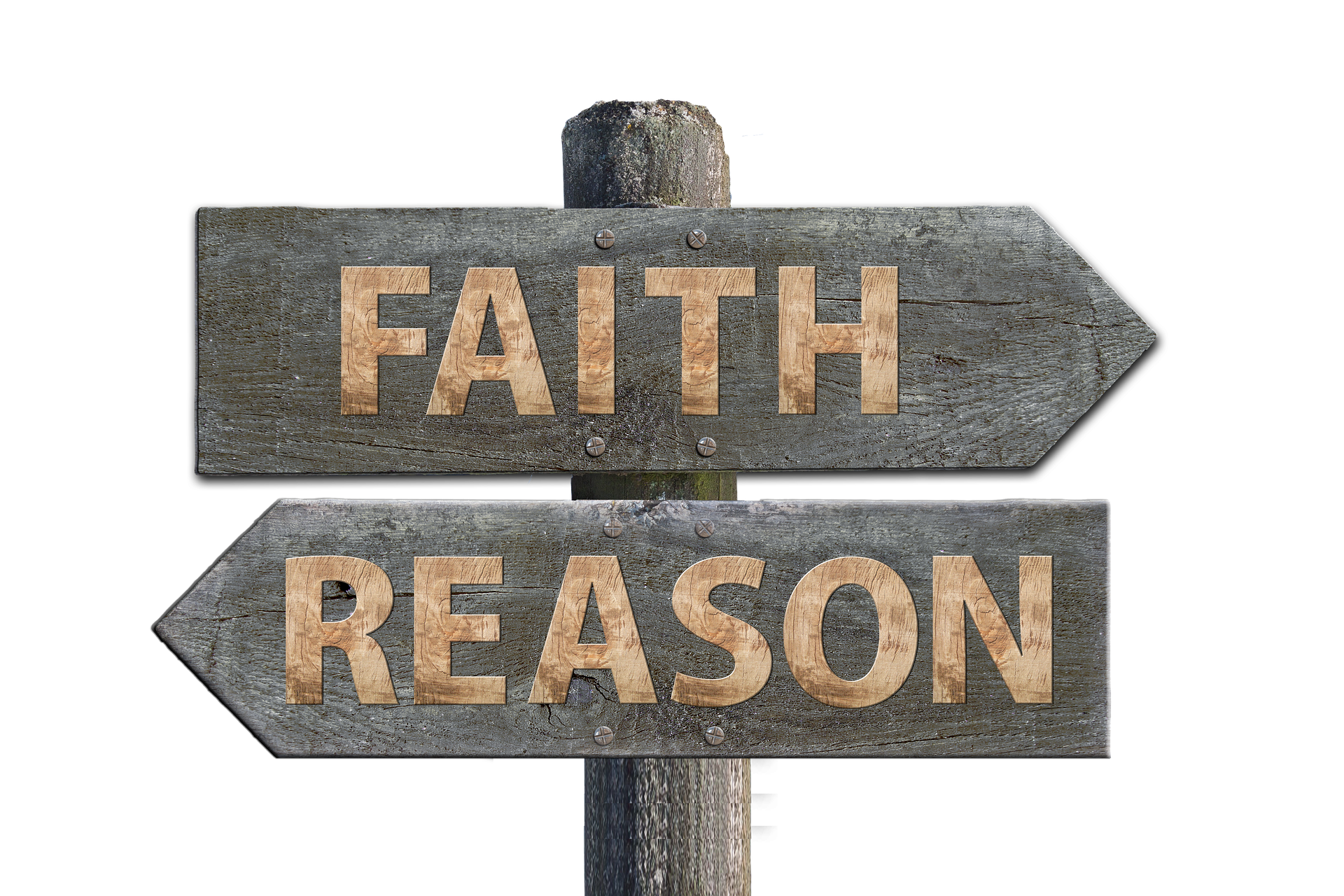FAITH AND REASON:
EXPLORING SOFT RATIONALISM

in partial fulfillment for the course
PH 501 Philosophy of Christian Religion
Ptr. Joseph Okello, Ph.D.
Professor of Philosophy of Christian Religion
Rev. Jared Ingle, M.A., M.T.S.
November 30, 2010, Monday
-lines represent pagination in the original, commissioned article | picture and extra credits inserted at the time of this update | footnotes are reserved
Thesis
What is the relationship between faith and reason? Do they undermine or compliment each other? Critical or Soft Rationalism offers a compromise. “It emphasizes the role of reason in criticizing, or critically evaluating, religious beliefs, as opposed to conclusively establishing such beliefs as true.” I agree with Soft Rationalism, yet believe there is more to be explored.
“Wisdom is the principal thing; therefore get wisdom: and with all thy getting get understanding” – Proverbs 4.7 (King James Version).
Arguments: Strong Rationalism, Fideism, and Critical (Soft) Rationalism
Strong Rationalism
Strong Rationalism proposes that faith must stand the test of reason. William Clifford argues that we must believe only what we have sufficient evidence for. Because religions do not offer sufficient evidence, it is wrong to believe in religion.
First, the writings of Thomas Aquinas and John Locke are used to build the case for Christianity. Secondly, it is argued that few have the time for such a rational investigation of their faith. Thirdly, one might ask, what counts as sufficient evidence?
Further objections are raised. Is the Strong Rationalist prejudice against religion from the start? Are there any universally convincing arguments for any worldview? Is there enough support for the scientific argument in the first place? Does science always operate on a strict rationale like the scientific method? Are Clifford’s claims supported by reason?
Fideism
While Strong Rationalism requires too much of faith, Fideism may require to little. We must accept faith without reason. Proving our rational arguments, premises, and assumptions is a never-ending process. Our assumptions are based on faith, and it is wrong to try to prove faith. “It is sometimes said that if we test God’s Word by logic, or science, we are really worshipping science or logic rather than God!”
Soren Kirkegaard argues that the more we try to explore faith through reason, the more we put off making a decision for God. He calls this the approximation process. If we can prove God exists, then we have no faith. We must take a leap of faith. His argument refutes the demands of Strong Rationalism. At some point, faith remains. Jesus answers His critics who want proof with, “A wicked and adulterous generation asks for a miraculous sign” – Matthew 12.39 (New International Version).
There are some objections to Fideism. We may desire to take a leap of faith, but which faith? Is it really possible to keep from rationally evaluating faith? Does not Fideism itself use arguments to support its claims? “Simply ignoring such challenges leaves one open to the suspicion that one is not really interested in what is true, but only in holding to one’s present beliefs regardless.” We may question the motivation of one who subscribes to Fideism.
Soft (Critical) Rationalism
A third view attempts to blend faith and reason. Soft Rationalism, “emphasizes the role of reason in criticizing, or critically evaluating, religious beliefs, as opposed to conclusively establishing such beliefs as true.” Faith answers to reason, but faith cannot be fully proven.
Reason has a role in criticizing faith, not in establishing it. A criticized faith is a stronger faith. There are two types of Soft Rationalism: Critical Rationalism and Critical Anti-Evidentialism.
First of all, Critical Evidentialism purports that we must provide good grounds for our faith, but we will never convince everyone. However, having grounds for our faith is essential for the reasonable believer.
Faith must enter honest dialogue. “To the extent that one individual has made an effort to engage others in critical dialog, he is entitled to regard his commitments as no longer mere prejudices but as convictions . . . Philosophy of religion, I believe, is best viewed as a process of critical dialogue.”
Similarly, Peter exclaimed, “But in your hearts set apart Christ as Lord. Always be prepared to give an answer to everyone who asks you to give the reason for the hope that you have. But do this with gentleness and respect” – 1 Peter 3.15 (see also Colossians 4.6, NIV). Peter not only asks us to engage faith and reason, but also to win souls at that crossroads.
A second type of Soft Rationalism is Critical Anti-Evidentialism, which makes no attempt to support faith with reason, because faith stands alone. However, faith is not exempt from rational inquiry. If objections are raised, they must be met. In a way, Critical Evidentialism is pro-active and Critical Anti-Evidential is reactive.
Thomas Aquinas is noted because his thoughts can be utilized against Strong Rationalism. However, he may also support Soft Rationalism.
Some truths about God exceed all the ability of the human reason. Such is the truth that God is triune. But there are some truths which the natural reason also is able to reach. Such are that God exists, that He is one, and the like. In fact, such truths about God have
been proved demonstratively by philosophers guided by the light of natural reason.
There are truths about God that are above us and truths that we understand through reason. This supports Soft Rationalism and Critical Evidentialism.
Soft Rationalism offers a process for evaluating beliefs, starting with a belief, and looking for reasons for and against it. Truths may be accepted by faith. But if the belief can be evaluated, then one looks for logical consistency, explanatory power, and factual adequacy. Overall, explaining beliefs may never prove an entire worldview. However, Soft Rationalism is a way to measure one’s worldview against others.
Objections
Although there are few objections to Soft Rationalism, the following ones and their responses may be found in the dialogue of the writers.
Soren Kierkegaard writes, “The existing individual who chooses to pursue the objective way enters upon the entire approximation process by which it is proposed to bring God to light objectively. But this is in all eternity impossible, because God is a subject, and therefore exists only for subjectivity in inwardness.” The process of evaluation can go on forever. At some point, one has to make a subjective decision for or against God.
Michael Peterson et al. responds by stating that one may find enough evidence to convince himself, but not enough to convince others. Also a Soft Rationalist, “needs the competing views both in order to assess their merits in comparison with her own and for the sake of the penetrating criticism of her own view which is most likely to come from those who do not
share it.” She needs criticism to keep her honest.
Stephen Evans suggests Critical Dialogue, a necessity of Soft Rationalism. He offers the example of college students losing faith in university settings, implying that their faith is weak because it cannot stand up to argument. He concludes, “Can one really believe in God wholeheartedly and at the same time assert that one can only continue to believe by refusing to consider the evidence against one’s belief?”
There are some flaws in Evans’ assertion. What is a college freshman compared to a Professor with a Ph.D. and polished arguments? Even if other students challenge one’s faith, they probably learn their arguments from a Professor. Is it fair to assume that a freshman has a weak faith because he cannot argue with a Professor who has studied many faiths and has looked for ways to debunk them?
Secondly, do professors offer arguments for the faith as well? If this is truly a dialogue, then the professor must offer both sides of the argument. A freshman may not even know the arguments against his faith, much less the arguments for it.
I disagree with Evans’ assertion on this point. This is academic irresponsibility at best, or an all-out attack against the underpinnings of faith at worst.
Another objection is that the process for evaluating beliefs is philosophical, based on Western intelligence. In other cultures, whole groups of people come to the Lord as a community. Their logical reasoning is not based on individual rationale but on the leader’s opinion, the display of power in the evangelist’s ministry, or a tribal council. Michael Peterson et al. cites the tragedy at Jonestown, a mass suicide arranged by a few religious leaders who
wielded control over a group of people. This is a negative example, but is there a positive one?
Groups operate with a different mentality, sometimes negatively referred to as mob mentality or groupthink. But should it be dismissed as irrational? Is their logical reasoning inferior to ours? William James, who argues against Strong Rationalism, recognizes the intelligence of systems thinking, even though Soft Rationalism is silent on this issue.
A social organism of any sort whatever, large or small, is what it is because each member proceeds to his own duty with a trust that the other members will simultaneously do theirs . . . A government, an army, a commercial system, a ship, a college, an athletic team, all exist on this condition, without which not only is nothing achieved, but nothing is even attempted.
A final objection to Soft Rationalism is that it attempts to separate faith and reason as mutually exclusive operations of the soul. However, Thomas Aquinas raises an issue that is not matched by philosophers after him.
Men are ordained by the divine Providence towards a higher good than human fragility can experience in the present life. That is why it was necessary for the human mind to be called to something higher than the human reason here and now can reach, so that it would thus learn to desire something and with zeal tend towards something that surpasses the whole state of the present life.
Aquinas argues that there is a divine wisdom, an understanding touched by God. He gives examples of the Charismata, the corporate Gifts of the Holy Spirit. He proposes that there are ways of thinking that are directed by the Spirit. Soft Rationalism does not explain this.
William James attempts: “Our passional nature not only lawfully may, but must, decide an option between propositions, whenever it is a genuine option that cannot by its nature be decided on intellectual grounds.” However, James’ thesis is different than Aquinas because the
passional ability to make decisions is only engaged when the intellectual capabilities have no logical answer. What happens when logic reaches one conclusion, and passion another?
Michael Peterson et al. attempts as well: “Religious faith is, in many respects, more like trusting a person than it is like accepting a scientific theory.” James explores trust and expectation, which are on-going relational dynamics, not just a one-time rational decision. Relationships are not based on empirical evidence, but on faith and trust. If faith is turned toward God, then, “The universe is no longer a mere It to us, but a Thou, if we are religious; and any relation that may be possible from person to person might be possible here.”
Critical Rationalism allows for ways of relating to God that are outside the realm of logic, such as passion or relationship. However, the concept proposed by Aquinas is largely unexplored, that is divine wisdom. Is it possible that God intends for faith and reason to be interrelated more than we realize?
Conclusion
This paper explores faith and reason, starting with Strong Rationalism and Fideism. However, the basic premise of Soft Rationalism is adopted as a thesis. Reason plays a role in criticizing faith, but cannot establish faith. A faith that is criticized is a stronger faith. Objections are raised and responded to as possible, referencing the writers. A pressing objection is that Aquinas has not been more thoroughly engaged on divine wisdom.
Jared, except for one minor glitch, you did an excellent job with this paper. I do not need to give you a breakdown of how you performed in the various sections. I simply ask you to do the math yourself. 99%. Great job!!
works consulted:
Thomas Aquinas, “The Harmony of Reason and Revelation,” Philosophy of Religion: Selected Readings, ed. Michael Peterson et al. (New York: Oxford University Press, 2010)
C. Stephen Evans, “Critical Dialogue,” Philosophy of Religion
William James, “The Will to Believe,” Philosophy of Religion
Soren Kierkegaard, “Truth is Subjectivity,” Philosophy of Religion
Michael Peterson et al., Reason & Religious Beliefs: An Introduction to the Philosophy of Religion (New York: Oxford University Press, 2009)













